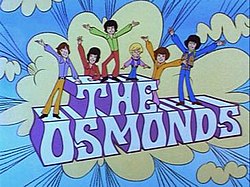| The Osmonds | |
|---|---|
 Title card | |
| Written by | Earl Doud William J. Keenan Claire Merrill Romeo Muller Iris Rainer |
| Directed by | Arthur Rankin, Jr. Jules Bass |
| Voices of | Paul Frees Iris Rainer Alan Osmond Wayne Osmond Merrill Osmond Jay Osmond Donny Osmond Jimmy Osmond |
| Theme music composer | George Jackson |
| Opening theme | "One Bad Apple" |
| Ending theme | "One Bad Apple" (reprise) |
| Composers | Maury Laws Alan Osmond Wayne Osmond Merrill Osmond |
| Country of origin | United States United Kingdom |
| No. of seasons | 1 |
| No. of episodes | 17 |
| Production | |
| Producers | Arthur Rankin, Jr. Jules Bass |
| Running time | 30 min. |
| Production companies | Rankin/Bass Productions Halas and Batchelor |
| Original release | |
| Network | ABC |
| Release | September 9 – December 23, 1972 |
The Osmonds is a 1972 ABC-TV Saturday morning cartoon series produced by Rankin/Bass Productions starring the Osmond Brothers. [1] Each episode features the family in a different location around the world, with young Jimmy's antics usually driving the plot of the episode. As with most television series oriented around bands, the Osmonds' songs were featured prominently in the series. The series also featured their talking pet dog, Fuji. [2] Marie Osmond did not appear in the series (save for being briefly depicted in "Transylvania,") as she would not make her performing debut until 1973. An abridged version of their hit song "One Bad Apple" was used for the opening and closing credits of the show.
Contents
Like Jackson 5ive , it used a laugh track created by Rankin/Bass, [3] but unlike the Jacksons, the Osmond brothers provided their own speaking voices in their series. [4]